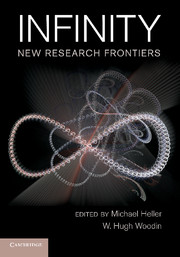Book contents
- Frontmatter
- Contents
- Contributors
- Preface
- Acknowledgments
- Introduction
- I Perspectives on Infinity from History
- II Perspectives on Infinity from Mathematics
- III Technical Perspectives on Infinity from Advanced Mathematics
- IV Perspectives on Infinity from Physics and Cosmology
- V Perspectives on Infinity from Philosophy and Theology
- 11 God and Infinity: Directions for Future Research
- 12 Notes on the Concept of the Infinite in the History of Western Metaphysics
- 13 God and Infinity: Theological Insights from Cantor's Mathematics
- 14 A (Partially) Skeptical Response to Hart and Russell
- Index
- References
12 - Notes on the Concept of the Infinite in the History of Western Metaphysics
Published online by Cambridge University Press: 07 June 2011
- Frontmatter
- Contents
- Contributors
- Preface
- Acknowledgments
- Introduction
- I Perspectives on Infinity from History
- II Perspectives on Infinity from Mathematics
- III Technical Perspectives on Infinity from Advanced Mathematics
- IV Perspectives on Infinity from Physics and Cosmology
- V Perspectives on Infinity from Philosophy and Theology
- 11 God and Infinity: Directions for Future Research
- 12 Notes on the Concept of the Infinite in the History of Western Metaphysics
- 13 God and Infinity: Theological Insights from Cantor's Mathematics
- 14 A (Partially) Skeptical Response to Hart and Russell
- Index
- References
Summary
The Infinite as a Metaphysical Concept
1. There is not – nor has there ever been – any single correct or univocal concept of the infinite. Indeed, the very word by which the concept is named typically – and appropriately – possesses a negative form and is constructed with a privative prefix: a[-peiron, aj-perivlhpton, aj-ovriston, aj-pevranton, aj-mevtrhton, in-finitum, Un-endliche, and so on. In order, therefore, to fix on a proper conceptual “definition” of the infinite, it is necessary to begin with an attempt to say what the infinite is not.
2. Before that, however, one ought to distinguish clearly between the “physical” (or mathematical) and “metaphysical” (or ontological) acceptations of the word “infinite.” The former, classically conceived, concerns matters of quantitative inexhaustibility or serial interminability and entered Western philosophy at a very early date. Even in pre-Socratic thought, questions were raised – and paradoxes explored – regarding such imponderables as the possibility of infinite temporal duration, or of infinite spatial extension, or of infinite divisibility, and mathematicians were aware from a very early period that the infinite was a function of geometric and arithmetical reasoning, even if it could not be represented in real space or real time (that is to say, a straight line must be understood as logically lacking in beginning or end, and the complete series of real, whole, even, odd, etc., numbers must be understood as logically interminable).
Information
- Type
- Chapter
- Information
- InfinityNew Research Frontiers, pp. 255 - 274Publisher: Cambridge University PressPrint publication year: 2011
References
Accessibility standard: Unknown
Why this information is here
This section outlines the accessibility features of this content - including support for screen readers, full keyboard navigation and high-contrast display options. This may not be relevant for you.Accessibility Information
- 3
- Cited by
